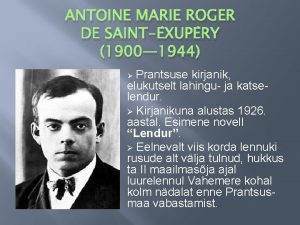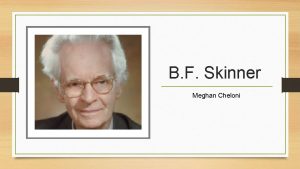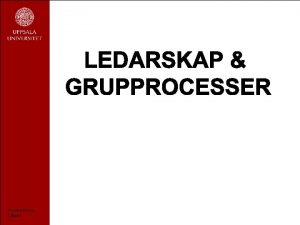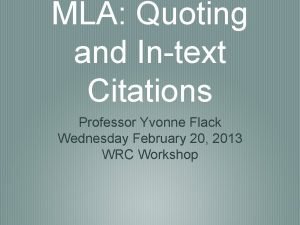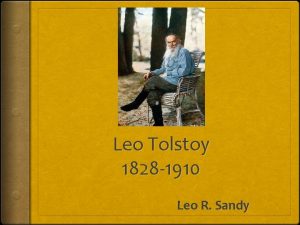Angela Davis 1944 Leo R Sandy Angela Yvonne





































- Slides: 37

Angela Davis 1944 - Leo R. Sandy

Angela Yvonne Davis (born January 26, 1944) is an American political activist, academic, and author. She emerged as a prominent counterculture activist in the 1960 s working with the Communist Party USA, of which she was a member until 1991, and was briefly involved in the Black Panther Party during the Civil Rights Movement Davis is a professor emerita at the University of California, Santa Cruz, in its History of Consciousness Department. She is also a former director of the university's Feminist Studies department

Her research interests are feminism, African-American studies, critical theory, Marxism, popular music, social consciousness, and the philosophy and history of punishment and prisons She co-founded Critical Resistance, an organization working to abolish the prison–industrial complex Her membership in the Communist Party USA (CPUSA) led California Governor Ronald Reagan in 1969 to attempt to have her barred from teaching at any California university Angela Davis was born in Birmingham, Alabama. Her family lived in the "Dynamite Hill" neighborhood, which was marked in the 1950 s by the bombings of houses in an attempt to intimidate and drive out middle-class blacks who had moved there

Davis occasionally spent time on her uncle's farm and with friends in New York City. She had two brothers, Ben and Reginald, and a sister, Fania. Ben played defensive back for the Cleveland Browns and Detroit Lions in the late 1960 s and early 1970 s Davis attended Carrie A. Tuggle School, a segregated black elementary school, and later, Parker Annex, a middle-school branch of Parker High School in Birmingham

During this time, Davis's mother, Sallye Bell Davis, was a national officer and leading organizer of the Southern Negro Youth Congress, an organization influenced by the Communist Party aimed at building alliances among African Americans in the South Davis grew up surrounded by communist organizers and thinkers, who significantly influenced her intellectual development Davis was involved in her church youth group as a child, and attended Sunday school regularly. She attributes much of her political involvement to her involvement with the Girl Scouts of the United States of America

She also participated in the Girl Scouts 1959 national roundup in Colorado. As a Girl Scout, she marched and picketed to protest racial segregation in Birmingham By her junior year of high school, Davis had been accepted by an American Friends Service Committee (Quaker) program that placed black students from the South in integrated schools in the North. She chose Elisabeth Irwin High School in Greenwich Village Davis was awarded a scholarship to Brandeis University in Waltham, Massachusetts, where she was one of three black students in her class. She encountered the Frankfurt School philosopher Herbert Marcuse at a rally during the Cuban Missile Crisis and became his student

In a 2007 television interview, Davis said, "Herbert Marcuse taught me that it was possible to be an academic, an activist, a scholar, and a revolutionary She worked part-time to earn enough money to travel to France and Switzerland attended the eighth World Festival of Youth and Students in Helsinki She returned home in 1963 to a Federal Bureau of Investigation interview about her attendance at the Communist-sponsored festival

During her second year at Brandeis, Davis decided to major in French and continued her intensive study of philosopher and writer Jean-Paul Sartre. She was accepted by the Hamilton College Junior Year in France Program Classes were initially at Biarritz and later at the Sorbonne. In Paris, she and other students lived with a French family She was in Biarritz when she learned of the 1963 Birmingham church bombing, committed by members of the Ku Klux Klan, in which four black girls were killed. She grieved deeply as she was personally acquainted with the victims

Nearing completion of her degree in French, Davis realized her major interest was philosophy. She was particularly interested in Marcuse's ideas On returning to Brandeis, she sat in on his course. Marcuse, she wrote in her autobiography, was approachable and helpful She began making plans to attend the University of Frankfurt for graduate work in philosophy In 1965, she graduated magna cum laude, a member of Phi Beta Kappa

In Germany, with a monthly stipend of $100, she lived first with a German family and later with a group of students in a loft in an old factory. Many of her roommates were active in the radical Socialist German Student Union (SDS), and Davis participated in some SDS actions. Events in the United States, including the formation of the Black Panther Party and the transformation of Student Nonviolent Coordinating Committee (SNCC) to an all-black organization, drew her interest upon her return

Marcuse had moved to a position at the University of California, San Diego, and Davis followed him there after her two years in Frankfurt. On her way back, she stopped in London to attend a conference on "The Dialectics of Liberation. " The black contingent at the conference included the Trinidadian-American Stokely Carmichael and the British Michael X. Although moved by Carmichael's rhetoric, Davis was reportedly disappointed by her colleagues' black nationalist sentiments and their rejection of communism as a "white man's thing”

She joined the Che-Lumumba Club, an all-black branch of the Communist Party USA named for international Communist sympathizers and leaders Che Guevara and Patrice Lumumba, of Cuba and the Congo, respectively Davis earned a master's degree from the University of California, San Diego, in 1968. She earned a doctorate in philosophy from Humboldt University in East Berlin Beginning in 1969, Davis was an acting assistant professor in the philosophy department at the University of California, Los Angeles (UCLA

Although both Princeton and Swarthmore had tried to recruit her, she opted for UCLA because of its urban location. At that time, she was known as a radical feminist and activist, a member of the Communist Party USA, and an associate of the Black Panther Party The Board of Regents of the University of California, urged by then-California Governor Ronald Reagan, fired her from her $10, 000 a year post in 1969 because of her membership in the Communist Party The Board of Regents was censured by the American Association of University Professors for its failure to reappoint Davis after her teaching contract expired

On October 20, when Judge Jerry Pacht ruled the Regents could not fire Davis solely because of her affiliation with the Communist Party, Davis resumed her post The Regents released Davis again, on June 20, 1970, for the "inflammatory language" she had used in four different speeches. The report stated, "We deem particularly offensive such utterances as her statement that the regents 'killed, brutalized (and) murdered' the People's Park demonstrators, and her repeated characterizations of the police as 'pigs

Davis was a supporter of the Soledad Brothers, three inmates accused of killing a prison guard at Soledad Prison On August 7, 1970, heavily armed 17 -year-old African. American high-school student Jonathan Jackson, whose brother was George Jackson, one of the three Soledad Brothers, gained control over a courtroom in Marin County, California He armed the black defendants and took Judge Harold Haley, the prosecutor, and three female jurors as hostages. As Jackson transported the hostages and two black convicts away from the courtroom, the police began shooting at the vehicle The judge and the three black men were killed in the melee; one of the jurors and the prosecutor were injured

Davis had purchased several of the firearms Jackson used in the attack Marin County Superior Court Judge Peter Allen Smith charged Davis with "aggravated kidnapping and first degree murder in the death of Judge Harold Haley" and issued a warrant for her arrest On August 18, four days after the warrant was issued, the FBI director J. Edgar Hoover listed Davis on the FBI's Ten Most Wanted Fugitive List; she was the third woman and the 309 th person to be listed

Soon after, Davis became a fugitive and fled California. According to her autobiography, during this time she hid in friends' homes and moved at night. On October 13, 1970, FBI agents found her at a Howard Johnson Motor Lodge in New York City President Richard M. Nixon congratulated the FBI on its "capture of the dangerous terrorist Angela Davis” On January 5, 1971, Davis appeared at Marin County Superior Court and declared her innocence before the court and nation

While being held in the Women's Detention Center, Davis was initially segregated from other prisoners, in solitary confinement. With the help of her legal team, she obtained a federal court order to get out of the segregated area Across the nation, thousands of people began organizing a movement to gain her release. In New York City, black writers formed a committee called the Black People in Defense of Angela Davis John Lennon and Yoko Ono contributed to this campaign with the song "Angela”

In 1972, after a 16 -month incarceration, the state allowed her release on bail from county jail On February 23, 1972, Rodger Mc. Afee, a dairy farmer from Fresno, California, paid her $100, 000 bail with the help of Steve Sparacino, a wealthy business owner The United Presbyterian Church paid some of her legal defense expenses A defense motion for a change of venue was granted, and the trial was moved to Santa Clara County. On June 4, 1972, after 13 hours of deliberations, the all-white jury returned a verdict of not guilty

After her acquittal, Davis went on an international speaking tour in 1972 and included Cuba, where she had previously been received by Fidel Castro in 1969 as a member of a Communist Party delegation Davis perceived Cuba to be a racism-free country, which led her to believe that, "only under socialism could the fight against racism be successfully executed. " When she returned to the United States, her socialist leanings increasingly influenced her understanding of race struggles In August 1972, Davis visited the USSR at the invitation of the Central Committee, and received an honorary doctorate from Moscow State University

On May 1, 1979, she was awarded the Lenin Peace Prize from the Soviet Union In a New York City speech on July 9, 1975, Russian dissident and Nobel Laureate Aleksandr Solzhenitsyn told an AFL-CIO meeting that Davis was derelict in having failed to support prisoners in various socialist countries around the world, given her strong opposition to the US prison system Davis was a Professor of Ethnic Studies at the San Francisco State University from at least 1980 to 1984. She was a professor in the History of Consciousness and the Feminist Studies Departments at the University of California, Santa Cruz and Rutgers University from 1991 to 2008. m. Since then, she has been Distinguished Professor Emerita

Davis was a Distinguished Visiting Professor at Syracuse University in Spring 1992 and October 2010 In 2014, Davis returned to UCLA as a Regents' Lecturer. She delivered a public lecture on May 8 in Royce Hall, where she had given her first lecture 45 years earlier On May 22, 2016, Davis was awarded an honorary Doctor of Humane Letters in Healing and Social Justice from the California Institute of Integral Studies in San Francisco during its 48 th annual commencement ceremony

Davis has written several books. A principal focus of her current activism is the state of prisons in the United States. She considers herself an abolitionist, not a "prison reformer. " She has referred to the United States prison system as the "prison–industrial complex, "aggravated by the establishment of privately owned and run prisons Davis advocates focusing social efforts on education and building "engaged communities" to solve various social problems now handled through state punishment Davis was one of the founders of Critical Resistance, a national grassroots organization dedicated to building a movement to abolish the prison–industrial complex

In recent works, she has argued that the US prison system more closely resembles a new form of slavery than a criminal justice system. According to Davis, between the late 19 th century and the mid-20 th century, the number of prisons in the United States sharply increased but crime rates continued to fall (see Michelle Alexander’s The New Jim Crow) She argues that racism in American society during this time was demonstrated by the disproportionate share of the African-American population who were incarcerated. "What is effective or just about this 'justice' system? " she urged people to ask

Davis has lectured at Rutgers University, San Francisco State University, Stanford University, Smith College, Bryn Mawr College, Brown University, Syracuse University, and other schools. As most of her teaching is at the graduate level, she says that she concentrates more on posing questions that encourage development of critical thinking than on imparting knowledge In 1997, she identified as a lesbian in Out magazine As early as 1969, Davis began public speaking engagements. She expressed her opposition to the Vietnam War, racism, sexism, and the prison–industrial complex, and her support of gay rights and other social justice movements. In 1969, she blamed imperialism for the troubles oppressed populations suffer

In 2001 she publicly spoke against the war on terror following the 9/11 attacks, continued to criticize the prison–industrial complex, and discussed the broken immigration system She said that to solve social justice issues, people must "hone their critical skills, develop them and implement them. " Later, in the aftermath of Hurricane Katrina in 2005, she declared that the "horrendous situation in New Orleans" was due to the country's structural racism, capitalism, and imperialism.

Davis opposed the 1995 Million March, arguing that the exclusion of women from this event promoted male chauvinism. She said that Louis Farrakhan and other organizers appeared to prefer that women take subordinate roles in society. Together with Kimberlé Crenshaw and others, she formed the African American Agenda 2000, an alliance of Black feminist Davis has continued to oppose the death penalty At the 27 th Empowering Women of Color Conference in 2012, Davis said she was a vegan

Davis supports the Boycott, Divestment and Sanctions campaign against Israel Davis was an honorary co-chair of the January 21, 2017 Women's March on Washington, which occurred the day after President Trump's inauguration On January 7, 2019, the Birmingham Civil Rights Institute (BCRI) rescinded Davis's Fred Shuttlesworth Human Rights Award, saying she "does not meet all of the criteria". Birmingham Mayor Randall Woodfin and others cited criticism of Davis's vocal support for Palestinian rights and the movement to boycott Israel

Davis said her loss of the award was "not primarily an attack against me but rather against the very spirit of the indivisibility of justice. ” On January 25, the BCRI reversed its decision and issued a public apology, stating that there should have been more public consultation

Quotes We are facing a common enemy and that enemy is Yankee Imperialism, which is killing us both here and abroad. Now I think anyone who would try to separate those struggles, anyone who would say that in order to consolidate an anti-war movement, we have to leave all of these other outlying issues out of the picture, is playing right into the hands of the enemy I'm no longer accepting the things I cannot change. . . I'm changing the things I cannot accept

Quotes cont’d You have to act as if it were possible to radically transform the world. And you have to do it all the time Black women have had to develop a larger vision of our society than perhaps any other group. They have had to understand white men, white women, and black men. And they have had to understand themselves. When black women win victories, it is a boost for virtually every segment of society When children attend schools that place a greater value on discipline and security than on knowledge and intellectual development, they are attending prep schools for prison Prisons do not disappear social problems, they disappear human beings. Homelessness, unemployment, drug addiction, mental illness, and illiteracy are only a few of the problems that disappear from public view when the human beings contending with them are relegated to cages

Videos On Sexual Assault and Gender Violence On Diversity Angela Davis Immortal

Publications cont’d Blues Legacies and Black Feminism: Gertrude "Ma" Rainey, Bessie Smith, and Billie Holiday, Vintage Books (January 26, 1999), ISBN 0 -679 -77126 -3. Are Prisons Obsolete? , Seven Stories Press (April 2003), ISBN 1 -58322581 -1. Abolition Democracy: Beyond Prisons, Torture, and Empire, Seven Stories Press (October 1, 2005), ISBN 1 -58322 -695 -8. The Meaning of Freedom: And Other Difficult Dialogues (City Lights, 2012), ISBN 978 -0872865808. Freedom Is a Constant Struggle: Ferguson, Palestine, and the Foundations of a Movement, Haymarket Books (2015), ISBN 978 -1 -60846 -564 -4. Herbert Marcuse, Philosopher of Utopia: A Graphic Biography (foreword, City Lights, 2019), ISBN 9780872867857

Publications If They Come in the Morning: Voices of Resistance (New York: Third Press, 1971), ISBN 0 -893 -88022 -1. Angela Davis: An Autobiography, Random House (September 1974), ISBN 0 -394 -48978 -0. Joan Little: The Dialectics of Rape (New York: Lang Communications, 1975)[115] Women, Race, & Class (February 12, 1983), ISBN 0 -394 -71351 -6. Women, Culture & Politics, Vintage (February 19, 1990), ISBN 0679 -72487 -7. The Angela Y. Davis Reader (ed. Joy James), Wiley-Blackwell (December 11, 1998), ISBN 0 -631 -20361 -3.

References Angela David on Sexual Assault and Gender Violence. Retrieved from https: //video. search. yahoo. com/yhs/search? fr=yhs-sz 001&hsimp=yhs 001&hspart=sz&p=angela+davis#id=13&vid=064 e 5191 da 5 3 afbb 71 a 0 b 1 b 8892 aac 7 d&action=view Angela David on Diversity. Retrieved from https: //video. search. yahoo. com/yhs/search? fr=yhs-sz 001&hsimp=yhs 001&hspart=sz&p=angela+davis#id=13&vid=064 e 5191 da 5 3 afbb 71 a 0 b 1 b 8892 aac 7 d&action=view

References cont’d Angela Davis Immortal. Retrieved from https: //video. search. yahoo. com/yhs/search? fr=yhs-sz 001&hsimp=yhs 001&hspart=sz&p=angela+davis#id=31&vid=532 e 980306 fca 7 ff 8 ba 833 e 0 de 4 bd 8 fb&action=view Angela Davis Biography. Retrieved from https: //en. wikipedia. org/wiki/Angela_Davis Angela Davis Quotes. Retrieved from https: //www. azquotes. com/quote/813495

Questions and Comments
 Aeroplane flying
Aeroplane flying 1944
1944 Medical attendance rules 1944
Medical attendance rules 1944 Bombardement strasbourg 1944
Bombardement strasbourg 1944 Prantsuse kirjanik 1866-1944
Prantsuse kirjanik 1866-1944 1944 generation name
1944 generation name ブロードウェイブギウギ
ブロードウェイブギウギ Broadway boogie woogie 1943, piet mondrian 1872-1944
Broadway boogie woogie 1943, piet mondrian 1872-1944 June 6th 1944
June 6th 1944 A particular panda consumes 1944 calories
A particular panda consumes 1944 calories Butler education act
Butler education act La gouvernance économique mondiale depuis 1944
La gouvernance économique mondiale depuis 1944 Wassily kandinsky 1866-1944
Wassily kandinsky 1866-1944 Wassily kandinsky schule
Wassily kandinsky schule 25 maj 1944
25 maj 1944 Yvonne van ballegooijen
Yvonne van ballegooijen Yvonne genovese
Yvonne genovese Yvonne ollier
Yvonne ollier B. f. skinner yvonne blue
B. f. skinner yvonne blue Carolyn has 20 biscuits in a tin tree diagram
Carolyn has 20 biscuits in a tin tree diagram Yvonne delaney
Yvonne delaney Yvonne philips
Yvonne philips Yvonne fulmore
Yvonne fulmore Yvonne fulmore
Yvonne fulmore Yvonne regler
Yvonne regler Yvonne wijnands
Yvonne wijnands Yvonne manson
Yvonne manson Christiane moser
Christiane moser Yvonne ber
Yvonne ber Yvonne andersson-sköld
Yvonne andersson-sköld Personorienterad ledare
Personorienterad ledare Quote poem mla
Quote poem mla Baumschutz basel
Baumschutz basel Yvonne van kemenade
Yvonne van kemenade Yvonne nevejean
Yvonne nevejean Yvonne van kemenade
Yvonne van kemenade Waiting for godot analysis
Waiting for godot analysis Baukastenprinzip architektur
Baukastenprinzip architektur




